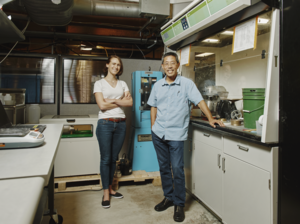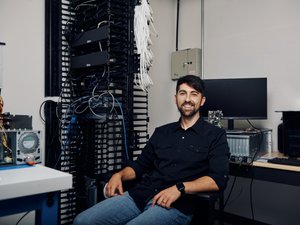Earlier this month, the Arthur Rock Center for Entrepreneurship at Harvard Business School announced the seven winners for the first $50,000 round of Minimum Viable Product (MVP) Funding. Based on Eric Ries’s Lean Startup methodology -- focused on rapid prototyping -- the fund was designed to help students push their ideas forward in the most effective, time efficient way possible. Forty-eight teams submitted for round one, while submissions for the second round of funding, open to both first and second-year students, are due January 20, 2012.
After the first seven winners were announced, I knew I only got the “present” part of the story. What I was most curious about, however, was the past (where the ideas originated) and the future (what was next for the teams who received funding?). So, here are the stories behind the MVP Funded.
BeautyX, Founded by Jamira Cotton (HBS 2012) Present: A social shopping site where women of color can discover beauty products based on user photos and reviews. Past: While studying engineering at MIT, Cotton became interested in the efficacy behind ingredients in beauty products, saying she soon became a “beauty product junkie.” She started reading forums and scanning blogs for information, but the search became too time consuming and fragmented, specifically for a woman of color. While doing research at HBS, Cotton discovered Tyra Banks was on campus for an executive education program and worked out in the campus gym every morning. Cotton put a flyer with her pitch in a bright pink envelope and began staking out the gym at 5:30 a.m. Unfortunately, Banks couldn’t accept the envelope because of legal risks, but she gave Cotton just the motivation she needed to begin developing her concept further from there. Future: The funding has helped with the development of a website, and Cotton is currently testing out the site with users and incorporating additional feedback before spreading the news about the official beta launch.
Colectivo, Founded by Jeremy Doutte, Antoine Bonnier & Antonin Blanc (HBS 2012) Present: An online group purchasing organization that allows small and medium-sized businesses to leverage their joint purchasing power to benefit from large discounts. Past: When working at McKinsey & Company, Doutte said he helped create a virtual online purchasing organization, and that the savings the company generated were tremendous. Doutte said he’s confident his team will be able to replicate the project at a much larger scale and help small businesses receive discounts. Future: The MVP funds will allow the team to test their current hypothesis to understand the real size of the opportunity they’re looking at. They’ve already begun collecting email addresses, and they soon hope to create an actual online store with a limited set of products in order to observe customer behavior and see if they manage to sell merchandise.
CPGlink, Founded by Benn Manning (HBS 2012) Present: An online business-to-business service platform that connects small- to mid-size domestic manufacturers with independent sales representatives and other companies that support the consumer packaged goods industry. Past: Before attending HBS, Manning worked as a buyer at Walmart and Sam’s Club buying snacks and candy. Often times, suppliers would call Manning with great product ideas, however, the “size of the prize” wasn’t big enough to warrant him working with them. He typically knew of independent sales representatives he’d like to recommended to manufactures though, and visa versa. He realized there was no resource for connecting them, which is when the idea for CPGlink was conceived. Future: Manning is currently working with developers, and will soon solidify their online, offline and PR campaigns for the official launch of the site in March. He said they’ll be performing a controlled beta site with about 100 users starting in January, but that the MVP product is focused on ensuring the algorithm works and effectively matches manufacturers with the right independent sales representatives. Manning currently has an intern from Harvard College working with him, as well as two people in the Philippines doing data extraction.
Eksis, Founded by David Sokoler (HBS 2012) Present: An online platform that utilizes Facebook’s social networking technology to connect job seekers and employers in Indonesia. Past: Several of Sokoler’s close friends are from Indonesia, and he learned that although Indonesia has the second largest pool of Facebook users in the world, recruiting is still primarily conducted offline, through newspapers and personal connections. Sokoler had some previous experience launching tech-based businesses outside of the United States, and has decided to develop a platform capable of transitioning the country’s job market online. Future: Sokoler is currently focused on building job content on the employer side of the website, and mobilizing job seekers to conduct their job hunt on Eksis.
Excelegrade, Founded by Jason Brein & Lauren Miller (HBS 2012) Present: An online software platform that allows K-12 teachers to design standards-based assessments, administer tests on mobile devices, automatically track student performance, conduct rigorous data analyses and create individualized progress reports. Past: Prior to attending HBS, Miller served as a teacher in Atlanta as a part of Teach for America. While teaching, Miller experienced, firsthand, the enormous amount of time educators spend outside of the classroom preparing assessments that align with state standards, grading and analyzing student performance and tailoring parts of their lessons to meet individual student needs. As a Teach for America corps member, Miller had to enter data for each question and student into an excel spreadsheet in order to analyze a student’s performance. She felt like there had to be a way to automate those administrative tasks, and set out to create an easy-to-use online software platform that would allow teachers to create standard-based assessments and grade tests, all while tracking their students’ improvement. Future: The team is using the funding to develop a beta version of Excelgrade’s online software. In early 2012, Miller said the company will partner with a middle school in Atlanta to conduct a product trial. About 10 eighth grade classrooms will be using the Excelegrade software, that teachers can currently sign up for on the site.
PeekPak, Founded by Maya Farah and George Audi (HBS 2012) Present: A new sampling channel for small and medium manufacturers in the food and beverage industry. Past: Both Farah and Audi are food addicts, especially when it comes to snacking. They said they frequently visit grocery stores like Whole Foods or Trader Joe’s looking for new, cool and, hopefully, healthy snacks. The idea originated during one of their visits, when they wished they could receive a box of “trendy” snacks straight to their doorstep. That’s what they hope to achieve with PeekPak. Future: Through the funding they’ve received, the duo plans to test whether this desire of receiving a box of new prepackaged foods in the mail is as appealing to the mass market as it is to them. They’re going to begin by putting together and delivering hundreds of kits to friends and family, and then test their reactions. As an immediate next step, they will also be launching a landing page to attract consumers to subscribe to their offering, and will begin meeting with prepackaged food manufacturers to sign them on to their pilot test.
Tenth & Taylor, Founded by Cynthia Samanian (HBS 2012) Present: An online home decor platform that efficiently bridges the gap between design inspiration and product purchase for consumers. Past: When visiting her hometown of Seattle over the summer, her older sister was looking to redecorate her home office. As a professional attorney, Samanian said her sister was having a hard time finding decor that fit her style and taste, and that she was inspired to create a tool that would allow people to find home decor efficiently. Future: Samanian is currently performing customer interviews, talking with people and showing them mock-ups. Her target demographic is still unclear, but she knows she wants to target both men and women. She’s also testing hypotheses around consumer purchase behavior.








